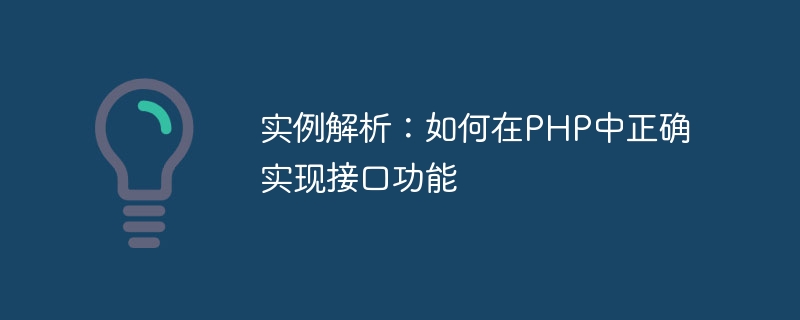Home >Backend Development >PHP Tutorial >Example analysis: How to correctly implement interface functions in PHP
Example analysis: How to correctly implement interface functions in PHP
- PHPzOriginal
- 2024-03-23 18:42:03696browse

In PHP programming, interface (Interface) is a very important concept, used to define the specification of a set of methods without including its specific implementation. Interfaces can help us implement the polymorphic features of object-oriented programming in the code and improve the maintainability and scalability of the code. This article will use examples to analyze how to correctly implement interface functions in PHP and provide specific code examples.
1. The basic concept of interface
In PHP, an interface can be understood as a contract that defines the methods that a class needs to implement. Any class can be considered an implementation class of this interface as long as it implements the methods defined by the interface. An interface is defined using the keyword interface, which contains a set of abstract methods (i.e. methods without concrete implementation).
2. Example requirements
Suppose we have a project management system and need to define an interface ProjectInterface, which is used to standardize the methods that need to be implemented by different types of project classes, including Get project name, get project description and get project progress.
3. Interface definition
First, we need to define the interface ProjectInterface, which contains three abstract methods:
<?php
interface ProjectInterface {
public function getName();
public function getDescription();
public function getProgress();
}
?>4. Implement the interface
Next, we create a class SoftwareProject to represent the software project and implement the methods defined in the ProjectInterface interface:
<?php
class SoftwareProject implements ProjectInterface {
private $name;
private $description;
private $progress;
public function __construct($name, $description, $progress) {
$this->name = $name;
$this->description = $description;
$this->progress = $progress;
}
public function getName() {
return $this->name;
}
public function getDescription() {
return $this->description;
}
public function getProgress() {
return $this->progress;
}
}
$softwareProject = new SoftwareProject("Web Application", "Developing a web application", 50);
echo $softwareProject->getName(); // Output: Web Application
echo $softwareProject->getDescription(); // Output: Developing a web application
echo $softwareProject->getProgress(); // Output: 50
?> In the above example In, the SoftwareProject class implements the getName(), getDescription() and getProgress()# defined in the ProjectInterface interface. ##Methods, by instantiating the SoftwareProject class and calling these methods, the name, description and progress information of the project can be obtained.
The above is the detailed content of Example analysis: How to correctly implement interface functions in PHP. For more information, please follow other related articles on the PHP Chinese website!

